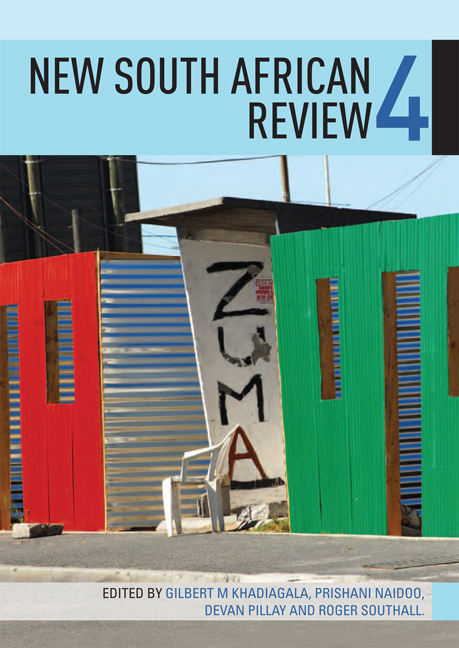Book contents
- Frontmatter
- Contents
- Preface
- Introduction: South Africa's fragile democracy: Twenty years on
- PART ONE ECOLOGY, ECONOMY AND LABOUR
- PART TWO POWER, POLITICS AND PARTICIPATION
- Introduction
- Chapter 6 Platinum, poverty and princes in post-apartheid South Africa: New laws, old repertoires
- Chapter 7 amaDiba moment: How civil courage confronted state and corporate collusion
- Chapter 8 Secrecy and power in South Africa
- Chapter 9 The contemporary relevance of Black Consciousness in South Africa
- Chapter 10 Death and the modern black lesbian
- PART THREE PUBLIC POLICY AND SOCIAL PRACTICE
- PART FOUR SOUTH AFRICA AT LARGE
- Contributors
- Index
Chapter 7 - amaDiba moment: How civil courage confronted state and corporate collusion
from PART TWO - POWER, POLITICS AND PARTICIPATION
Published online by Cambridge University Press: 21 April 2018
- Frontmatter
- Contents
- Preface
- Introduction: South Africa's fragile democracy: Twenty years on
- PART ONE ECOLOGY, ECONOMY AND LABOUR
- PART TWO POWER, POLITICS AND PARTICIPATION
- Introduction
- Chapter 6 Platinum, poverty and princes in post-apartheid South Africa: New laws, old repertoires
- Chapter 7 amaDiba moment: How civil courage confronted state and corporate collusion
- Chapter 8 Secrecy and power in South Africa
- Chapter 9 The contemporary relevance of Black Consciousness in South Africa
- Chapter 10 Death and the modern black lesbian
- PART THREE PUBLIC POLICY AND SOCIAL PRACTICE
- PART FOUR SOUTH AFRICA AT LARGE
- Contributors
- Index
Summary
Stories are the secret reservoir of values. Change the stories individuals and nations live by and tell themselves and you change the individuals and nations. If they tell themselves stories that are lies, they will suffer the future consequences of those lies. If they tell themselves stories that face their own truth they will free their histories for future flowerings.
(Ben Okri, poet and writer)This chapter, written from the perspective of a social work practitioner rather than that of an academic, tells the story of a latter-day ‘Mpondo revolt’, of how the coastal residents of the amaDiba clan within the Mpondo traditional kingship stood their ground to force the minister and officials responsible for mineral resources to revoke the award of mineral rights to an Australian-based venture capital mining company for heavy mineral deposits buried in their ancestral lands.
Between 2006 and 2008 the mining protagonists used bullying and underhand tactics to subvert local community resistance to what the community perceived to be the desecration of sacred sites, the destruction of crop and grazing lands and the forced resettlement of homesteads. Human rights violations had been reported to the South African Human Rights Commission in 2007 and concerted citizen action ultimately forced the minister of mineral resources to revoke the mining rights in May 2011. However, the Mpondo found that proving the proposed mining development to be an unjust violation of human rights was ultimately a moral and ethical argument rather than simply a matter of proving a case by legal disputation through the courts. It required civil courage: a praxis that transcended the normal activist strategy of civil disobedience by taking the noble ideals espoused by the preamble of the South African Constitution and strengthening the social fabric of this historically marginalised community. Civil disobedience is hard to sustain in the long run. In contrast, civil courage draws from endogenous potential, which is metabolised by connecting people with shared interests, affirming life and managing creative ideas and innovations that arise. It is fundamentally about spirit and soul; about creating shared meaning and common purpose by telling and retelling stories of empowerment; about facing our own truths to ‘free our history for future flowerings’ (Okri 1998).
- Type
- Chapter
- Information
- New South African Review , pp. 136 - 149Publisher: Wits University PressPrint publication year: 2014



